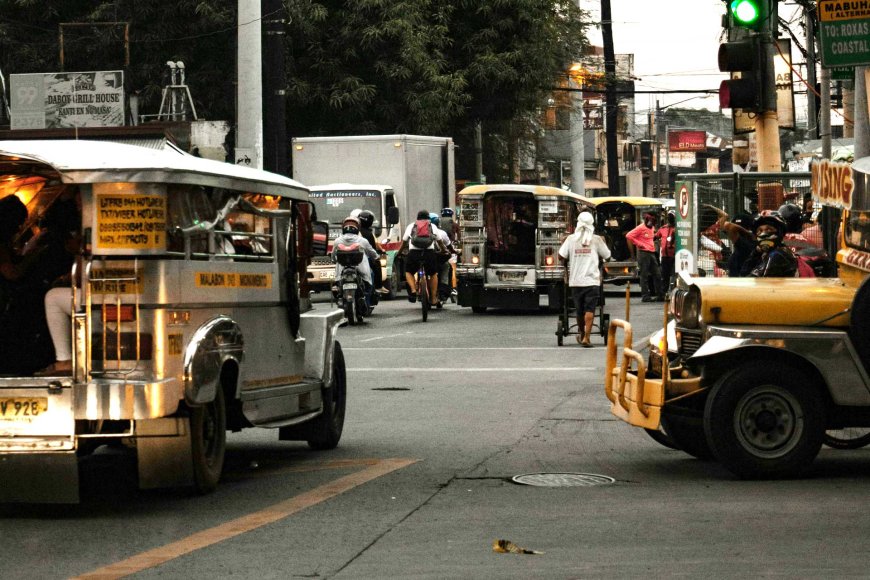Filipino "Kakulitan"
In Filipino culture, kakulitan stands out as a unique expression of stubbornness.
Where Rules Are Suggestions and Suggestions Are Ignored
Woven into the colorful fabric of Filipino society is something unique: the ever-present "kakulitan". It’s an intangible trait, a playful stubbornness that pervades everyday life. It shows up in various forms, from innocent mischief to eyebrow-raising defiance of common sense. One thing is certain: kakulitan brings out the best or worst, and the most puzzling aspects of Filipino life, from the streets to the halls of power.

"No Littering" – A Beautiful Suggestion
Starting with one of the most iconic phrases plastered on every wall, lamppost, and corner in the country: "Bawal magtapon ng basura dito" (No littering here). One might think the bold signage, sometimes even accompanied by a threatening graphic of a hefty fine, would deter people from leaving their snack wrappers, plastic cups, or cigarette butts in plain sight. But no.
In fact, these signs are like honey to bees, or in this case, basura to Juan. Rather than deterring littering, they seem to mark the exact spots where the trash piles up. People stroll past trash bins as though they were invisible, only to drop their garbage a few feet away. Some might even take it a step further—by not only ignoring the sign but by throwing a bag of trash directly underneath it, as if to say, "Challenge accepted."
In the Philippines, throwing trash in front of a “No Littering” sign isn’t just an act of rebellion; it’s practically a rite of passage.

“Bawal Tumawid Dito” – Where Danger is Fun
Pedestrians in the Philippines are not mere mortals—they are thrill-seekers. They scoff in the face of danger and laugh at the idea of using pedestrian lanes. "Bawal tumawid dito" (No crossing here) is seen by many as more of an invitation than a prohibition. Why walk to the pedestrian lane 50 meters away when you can dodge speeding cars right here?
Sure, there’s a footbridge, and yes, there’s a pedestrian crossing, but who needs safety when you can have adventure? It's the perfect place to test your agility and reaction time. If a game show could be made out of crossing busy streets illegally, Filipinos would win the grand prize every time.

The Jeepney King: “Stop? What Stop?”
The iconic Filipino jeepney. No discussion of kakulitan would be complete without mentioning the kings of the road. Jeepney drivers have a special relationship with traffic rules. They obey them only when it suits their schedule. Speed limits? Optional. Stop signs? Merely a suggestion. Traffic lanes? More like a vague guideline.
Jeepneys stop wherever they please—middle of the road, the sidewalk, under a bridge. Why wait for a designated stop when you can create your own? After all, who has time to pull over when your passengers need to hop off now?
Jeepney drivers are like artists, painting the streets with their unpredictable stopping patterns. It’s a performance that leaves both pedestrians and fellow motorists in awe.

The Land of Perpetual Fiesta Permits
In the Philippines, no occasion is too small to turn into a grand fiesta. But what about those pesky permits and licenses you need to secure before closing off half the town for a street dance? Bah! Who has time for that?
Noisy street parades, karaoke marathons, and giant street parties happen so often that people have accepted them as part of daily life. The noise ordinance is there, of course, but who’s really going to enforce it when everyone’s busy singing "My Way" until 3 a.m.?
In a land where fiesta permits are almost an afterthought, the real question is not "Did you get permission?" but "Where’s the party?"

The Red Light Special: Police Edition
Imagine you're stuck at a busy intersection. The light turns red, signaling everyone to stop. But wait! Here comes a police patrol vehicle, majestically gliding through the red light like a king passing through his subjects, ignoring traffic rules with the kind of confidence only the powerful can muster.
It's no secret that some officers of the law seem to treat traffic rules as mere suggestions, especially when they’re the ones breaking them. Is there an emergency? Is someone being rushed to the hospital? Probably not. More likely, they’re heading to "something" that just can’t wait. After all, who has time for red lights when one works for the government and has a badge.
That is why ordinary Filipinos can’t help but wonder: if the police, the supposed enforcers of the law, treat traffic rules like mere suggestions—blasting through red lights and parking wherever they please—what other regulations might be optional in their eyes? Perhaps they approach their duties like Boodle Fight, picking and choosing what to respect based on convenience or mood.

The Dynasties of Democracy
In a country that proudly claims to be a democracy, one would think that "Political Dynasties are Prohibited" would hold some water. But political families in the Philippines are as common as rice. Once one family member gets elected to office, it becomes a full-fledged family business. Mom becomes mayor, dad is a congressman, son is a barangay captain, and daughter is a city councilor. The family gatherings must be spectacularly political—“Whose turn is it to run for governor next?”
Dynasties are officially prohibited by the Constitution, but it's a rule that politicians seem to interpret as "optional" at best. In fact, some even claim it’s a matter of public service. "Our family has been serving the public for generations," they proudly declare, as though running the local government was an inherited crown, rather than an elected position. A noble tradition of selfless governance, or perhaps, just a way to ensure their family’s grip on power and influence never loosens.

Rules Are Just the Beginning
The art of kakulitan involves persistence, resourcefulness, and a bit of an annoying truth. It's a reminder that in the Philippines, rules aren't always made to be broken, but they’re definitely made to be bent, stretched, and—on occasion—completely ignored. Whether it's a sign prohibiting littering or a constitutional ban on political dynasties, kakulitan adds a touch of humor to the daily grind. It’s part of what makes Filipinos so unpredictable at times—and, let’s face it, endlessly entertaining.
Find Cheap Flight Tickets to any Destinations in Japan and the Philippines
Nipino.com is committed to providing you with accurate and genuine content. Let us know your opinion by clicking HERE.
































































